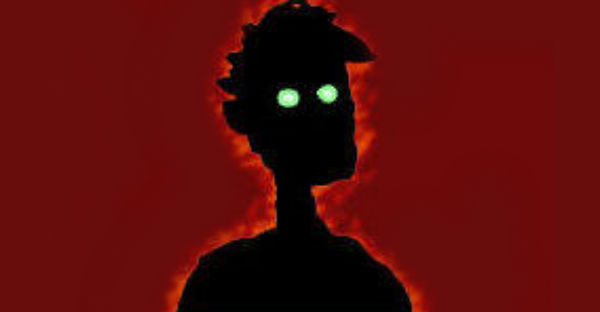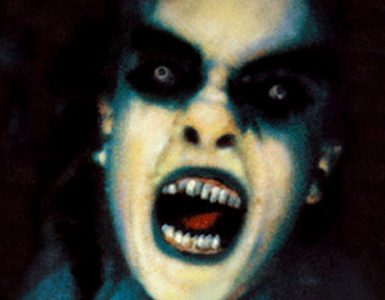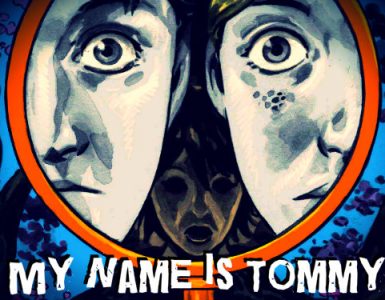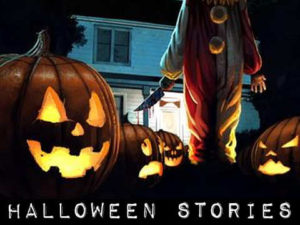The Damned Thing is a scary short story by Ambrose Bierce about an invisible monster on the loose in the Old West, that kills plants, animals and people. Ambrose Bierce said the story was based on a real incident he experienced while out hunting with his dog. He felt the presence of an invisible beast that seemed to be hunting him. The story was adapted as a horror comic in an issue of Creepy #4 (1975).

By the light of a tallow candle, a man was reading something written in a book. There were eight men in the small log cabin. Seven of them stood around the table, silent and motionless. The eighth man, Hugh Morgan, lay on the table, his face partly covered by a sheet, his arms at his sides. He was dead.
The man with the book was the coroner and he was conducting an inquest. The other men had gathered in the cabin to find out how Hugh Morgan had died. The book was a diary that had been found among the dead man’s possessions. As the men listened, the coroner read aloud from the book.
“…The sun had hardly risen when we left the house. We were looking for quail, each with a shotgun. Suddenly we heard a noise as if some animal was violently thrashing about in the bushes.

“Morgan had stopped and was intently watching the bushes. He said nothing, but he had cocked both barrels of his gun and was holding it in readiness to aim. The bushes were moving in the most inexplicable way. I can hardly describe it. It seemed as if they were stirred by a streak of wind, which not only bent them over, but pressed them down, crushing them so that they did not rise and this movement was slowly making its way directly toward us.
“‘What is it? What the devil is it?’ I asked.
“‘That Damned Thing!’ he replied, without turning his head. His voice was husky and unnatural. He trembled visibly. I saw him suddenly throw his gun to his shoulder and fire both barrels!
Before the smoke had cleared away I heard a loud savage cry — a scream like that of a wild animal. At the same instant I was thrown violently to the ground by the impact of something unseen in the smoke.
“I heard Morgan crying out as if in mortal agony, and mingling with his cries were such hoarse, savage sounds as one hears from fighting dogs. Inexpressibly terrified, I struggled to my feet and looked in the direction of Morgan’s retreat; and may Heaven in mercy spare me from another sight like that! At a distance of less than thirty yards was my friend, his head thrown back at a frightful angle, his long hair in disorder and his whole body in violent movement from side to side, backward and forward. His right arm was lifted and seemed to lack the hand — at least, I could see none. The other arm was invisible. It was as if he had been partly blotted out and then a shifting of his position would bring it all into view again.
“All this must have occurred within a few seconds, but before I could reach his side he was lying on the ground. All sounds had ceased and with a feeling of terror I realized he was dead.”
CHAPTER III
A MAN THOUGH NAKED MAY BE IN RAGS
The coroner rose from his seat and stood beside the dead man. Lifting an edge of the sheet he pulled it away, exposing the entire body, altogether naked and showing in the candle- light a clay-like yellow. It had, however, broad maculations of bluish black, obviously caused by extravasated blood from contusions. The chest and sides looked as if they had been beaten with a bludgeon. There were dreadful lacerations; the skin was torn in strips and shreds.
The coroner moved round to the end of the table and undid a silk handkerchief which had been passed under the chin and knotted on the top of the head. When the handkerchief was drawn away it exposed what had been the throat. Some of the jurors who had risen to get a better view repented their curiosity and turned away their faces. Witness Harker went to the open window and leaned out across the sill, faint and sick. Dropping the handkerchief upon the dead man’s neck the coroner stepped to an angle of the room and from a pile of clothing produced one garment after another, each of which he held up a moment for inspection. All were torn, and stiff with blood. The jurors did not make a closer inspection. They seemed rather uninterested. They had, in truth, seen all this before; the only thing that was new to them being Harker’s testimony.
“Gentlemen,” the coroner said, “we have no more evidence, I think. Your duty has been already explained to you; if there is nothing you wish to ask you may go outside and consider your verdict.”
The foreman rose — a tall, bearded man of sixty, coarsely clad.
“I shall like to ask one question, Mr. Coroner,” he said. “What asylum did this yer last witness escape from?”
“Mr. Harker,” said the coroner gravely and tranquilly, “from what asylum did you last escape?”
Harker flushed crimson again, but said nothing, and the seven jurors rose and solemnly filed out of the cabin.
“If you have done insulting me, sir,” said Harker, as soon as he and the officer were left alone with the dead man, “I suppose I am at liberty to go?”
“Yes.”
Harker started to leave, but paused, with his hand on the door latch. The habit of his profession was strong in him — stronger than his sense of personal dignity. He turned about and said:
“The book you have there — I recognize it as Morgan’s diary. You seemed greatly interested in it; you read in it while I was testifying. May I see it? The public would like — ”
“The book will cut no figure in this matter,” replied the official, slipping it into his coat pocket; “all the entries in it were made before the writer’s death.”
As Harker passed out of the house the jury re-entered and stood about the table, on which the now covered corpse showed under the sheet with sharp definition. The foreman seated himself near the candle, produced from his breast pocket a pencil and scrap of paper and wrote rather laboriously the following verdict, which with various degrees of effort all signed:
“We, the jury, do find that the remains come to their death at the hands of a mountain lion, but some of us thinks, all the same, they had fits.”
CHAPTER IV
AN EXPLANATION FROM THE TOMB
In the diary of the late Hugh Morgan are certain interesting entries having, possibly, a scientific value as suggestions. At the inquest upon his body the book was not put in evidence; possibly the coroner thought it not worth while to confuse the jury. The date of the first of the entries mentioned cannot be ascertained; the upper part of the leaf is torn away; the part of the entry remaining follows:
“…would run in a half-circle, keeping his head turned always toward the centre, and again he would stand still, barking furiously. At last he ran away into the brush as fast as he could go. I thought at first that he had gone mad, but on returning to the house found no other alteration in his manner than what was obviously due to fear of punishment.
“Can a dog see with his nose? Do odours impress some cerebral centre with images of the thing that emitted them?…
“Sept. 2. — Looking at the stars last night as they rose above the crest of the ridge east of the house, I observed them successively disappear — from left to right. Each was eclipsed but an instant, and only a few at a time, but along the entire length of the ridge all that were within a degree or two of the crest were blotted out. It was as if something had passed along between me and them; but I could not see it, and the stars were not thick enough to define its outline. Ugh! don’t like this.”
Several weeks’ entries are missing, three leaves being torn from the book.
“Sept. 27. — It has been about here again — I find evidences of its presence every day. I watched again all last night in the same cover, gun in hand, double-charged with buckshot. In the morning the fresh footprints were there, as before. Yet I would have sworn that I did not sleep — indeed, I hardly sleep at all. It is terrible, insupportable! If these amazing experiences are real I shall go mad; if they are fanciful I am mad already.
“Oct. 3. — I shall not go — it shall not drive me away. No, this is my house, my land. God hates a coward….
“Oct. 5. — I can stand it no longer; I have invited Harker to pass a few weeks with me — he has a level head. I can judge from his manner if he thinks me mad.
“Oct. 7. — I have the solution of the mystery; it came to me last night — suddenly, as by revelation. How simple — how terribly simple!
“There are sounds we cannot hear. At either end of the scale are notes that stir no chord of that imperfect instrument, the human ear. They are too high or too grave. I have observed a flock of blackbirds occupying an entire tree-top — the tops of several trees — and all in full song. Suddenly — in a moment — at absolutely the same instant — all spring into the air and fly away. How? They could not all see one another — whole tree-tops intervened. At no point could a leader have been visible to all. There must have been a signal of warning or command, high and shrill above the din, but by me unheard. I have observed, too, the same simultaneous flight when all were silent, among not only blackbirds, but other birds — quail, for example, widely separated by bushes — even on opposite sides of a hill.
“It is known to seamen that a school of whales basking or sporting on the surface of the ocean, miles apart, with the convexity of the earth between, will sometimes dive at the same instant — all gone out of sight in a moment. The signal has been sounded — too grave for the ear of the sailor at the masthead and his comrades on the deck — who nevertheless feel its vibrations in the ship as the stones of a cathedral are stirred by the bass of the organ.
“As with sounds, so with colours. At each end of the solar spectrum the chemist can detect the presence of what are known as ‘actinic’ rays. They represent colours — integral colours in the composition of light — which we are unable to discern. The human eye is an imperfect instrument; its range is but a few octaves of the real ‘chromatic scale.’ I am not mad; there are colours that we cannot see.
“And, God help me! the Damned Thing is of such a colour!”
The End.







Add comment